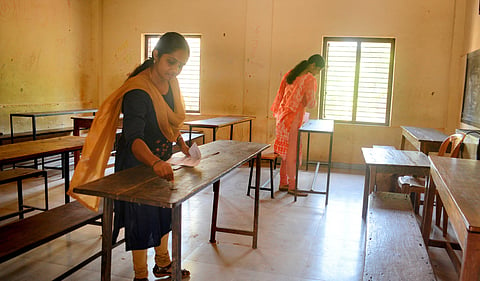

BENGALURU: The Covid-19 pandemic has pushed institutes of higher education between a rock and a hard place. They are trying to negotiate with parents on fees, while at the same time taking care of the expenditure to accommodate online education.
All this while the salaries for lecturers -- which dictate the quality of academic institutes, is weighing in on them. While a faculty member said that they received partial pay throughout and after the lockdown, institute heads said they are trying to find ways, including pay cuts, not to go under.
An official of a private college said that institutes may shut some of the programmes this year. Both students and institutions are struggling to tide over the crisis. While students are finding it hard to get loans to pay their fees, colleges are raising loans to make ends meet.
Also, professional colleges are anticipating a severe shortage of students this year, as non-Karnataka students are likely to refrain from taking up courses in the state, which is a hub of medical and engineering colleges.
An official of an engineering college, on condition of anonymity, said, “Admissions may be a challenge for many institutions. It may vary from 30-100% in different institutions and streams. But the average may stand at about 60- 65%. During pre-Covid times it used to be 70-75%.
This drop is because outside students are not coming to Karnataka.” Students are facing hardships as parents have been unable to get loans, said educationist Wooday P Krishna, president, Karnataka Private Postgraduate Colleges’ Association.
Now, banks are particular about the collateral, value of property, and insist that the property should be located within their area of operation, he said. Loans are normally taken for professional courses, like MBA and MCA, where the fee ranges from Rs 1.75 lakh to Rs 3 lakh.
A large chunk of students, nearly 20%, for these courses come from otherstates, but they don’t seem to be coming in, Krishna said.
Even students from rural areas are not moving to private institutes in neighbouring districts, and a large chunk of seats are vacant, he added. Standalone institutes that do not have the financial reserves like larger institutes and depend on annual fees for revenues are going under. It will take at least two years for institutes to break even, he predicted.
Christ University Vice-Father Abraham Vettiyankal M said that the financial hardships faced by parents can be gauged by their requests for concessions in fees and payments by instalments.
“This year, the admissions are over and the number of parents seeking such exemptions have been fewer. We are expecting a surge next year,” he said.
The largest expenditure for any institute is faculty salaries. It varies between 40 and 60 per cent of the total expenditure, while it is around 50 per cent for majority of institutes, said a source.
Till now, only a few institutes have not effected a pay cut, while a majority of colleges have told their faculty members that their while pending sums from their pruned salaries would be paid back once the situation returns to normal.
“Lecturers too have just salaries as their major source of income and they cannot be denied their livelihoods,” he said. Institutes are also waiting to start offline classes. “Only with physical classes will we have the moral right to seek fees from students,” said Krishna.